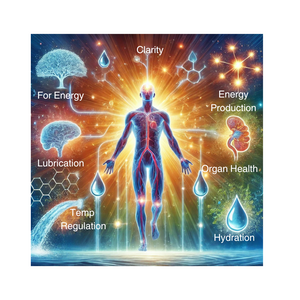Hydration: Your Body’s Lifeline
Water is the essence of life, yet its importance is often overlooked. From energy production to mental clarity, hydration plays a pivotal role in every system of your body. Understanding how water impacts your health and learning practical ways to stay hydrated can transform your well-being. This masterclass will take you on a deep dive into the science of hydration, its effects on the body, and actionable strategies to make hydration an effortless part of your daily routine.
The Role of Water in Your Body
Water makes up about 60% of your body and is involved in nearly every biological function. Here’s how it impacts various systems:

Energy Production: Water is essential for breaking down food and transporting nutrients to cells, which are critical for energy. Dehydration can lead to fatigue and a sluggish metabolism.
Brain Function: Even mild dehydration can impair cognitive performance, causing difficulty in focus, memory, and mental clarity.
Temperature Regulation: Through sweating, water helps regulate your body temperature during exercise or in hot environments.
Joint and Tissue Health: Water lubricates joints, protecting them from wear and tear while keeping tissues resilient and healthy.
Detoxification: The kidneys rely on water to filter toxins and waste from the blood, ensuring a healthy balance of electrolytes.

How Much Water Do You Need?
The commonly cited "8 cups a day" is a good starting point, but hydration needs vary based on factors such as age, activity level, climate, and overall health.
- Baseline Recommendation: The Institute of Medicine suggests about 3.7 liters (15.5 cups) of water per day for men and 2.7 liters (11.5 cups) for women, including fluids from food.
- Exercise and Climate: Add an additional 1-3 cups of water per hour of exercise or when exposed to hot, dry conditions.
- Signs of Adequate Hydration: Clear or light-colored urine, steady energy levels, and normal skin elasticity.

The Effects of Dehydration
Dehydration doesn’t just make you feel thirsty—it can have serious consequences for your body and mind:
- Physical Symptoms: Headaches, muscle cramps, dry skin, and rapid heartbeat.
- Cognitive Effects: Reduced focus, slower reaction times, and mood swings.
- Long-Term Risks: Chronic dehydration can contribute to kidney stones, urinary tract infections, and high blood pressure.
Strategies for Staying Hydrated

1. Make Water Accessible
Keep a reusable water bottle with you at all times. Look for one with measurement markings to track your intake throughout the day.

2. Eat Hydrating Foods
About 20% of your daily water intake comes from food. Include water-rich options like:
cucumbers, watermelon, oranges, strawberries, lettuce, zucchini, pineapple, celery, bell peppers, grapes, cantaloupe, and tomatoes.

3. Schedule Your Hydration
Create a hydration schedule to remind yourself to drink water at specific intervals, such as first thing in the morning, mid-morning, and before meals.

4. Flavor Your Water
If plain water feels boring, infuse it with natural flavors like lemon, mint, or cucumber or even Water Flavor Drops, Infuser Bottles, Electrolyte Drink Mixes, Herbal Tea Bags, Freeze Dried Fruits. If it will help you want to drink more then use it!
Hydration for Special Populations
Athletes
Sweat loss during intense exercise can lead to electrolyte imbalances. Consider electrolyte-enhanced drinks after high-intensity workouts lasting over an hour.
Older Adults
Aging reduces the sensation of thirst, making older adults more prone to dehydration. Encourage consistent water intake throughout the day.
Children
Kids are often active and need frequent reminders to hydrate, especially during sports or outdoor play.

How Hydration Supports Longevity
Proper hydration doesn’t just improve daily performance; it contributes to long-term health:
- Kidney Health: Prevents kidney stones and supports toxin removal.
- Heart Health: Reduces strain on the cardiovascular system, especially during physical activity.
- Skin Health: Keeps skin hydrated, reducing dryness and enhancing elasticity.
- Digestive Health: Aids in digestion and prevents constipation.


